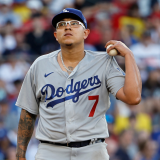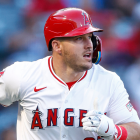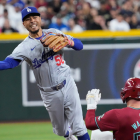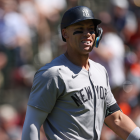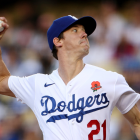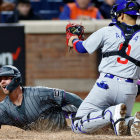We've sure been through a lot with batting average over the years, huh?
For generations, the batting average was considered the most important offensive stat. Over the last few decades there's been a statistical movement to focus much more on a wide variety of stats -- the more the better, to get a complete picture of a player -- including the popularization of on-base percentage, made mainstream in "Moneyball" (though by no means was that the impetus).
I've long argued OBP is the single most important offensive stat because it is not making outs. I'll hear "scoring runs" as a reply and my easy answer back is that if no one is making outs, tons of runs are getting scored.
Slugging percentage is also a lot more telling about a player's value than batting average. Average treats a single the same as a home run, and we know that a single isn't nearly as valuable as any extra-base hit.
Without conducting a poll or anything, I think it's safe to say the majority of die-hard baseball fans realize judging a player solely on batting average is silly.
Still, it's astounding how many people -- both among fans and media alike -- focus on it. How many times have you heard something like "he's a .220 hitter?" even in the last few years. It's still out there.
It's greatly misguided.
Let's use Bryce Harper. Given that he signed a 13-year, $330 million deal this past offseason, he was going to be under a microscope this season. Sure enough, I keep getting asked "what's wrong with him?" on the radio and social media. Why? He's "a .226 hitter." Yeah, that's low, but he goes through bouts of this. He hit .249 last year, but .319 the year before. In 2016, it was .243, but in 2015 it was .330.
Also, he hasn't been terrible at the plate by any stretch. He leads the NL with 25 walks and has scored 20 runs. He's helped Rhys Hoskins -- who hits behind him -- grab 31 RBI, which is third in the NL.
Let's circle back to the two more important rate stats. The league average OBP so far in 2019 is .319. Harper's at .364. That's a pretty big gap on the plus side. The league average slugging percentage is .419. Harper's at .452. Another gap.
This isn't to say Harper has been outstanding or anything. His 114 OPS+ says he's been 14 percent above league average -- ballpark-adjusted -- in those two categories. It's good, but not exceptional. To give perspective, there are eight NL players above 150 (Cody Bellinger, Christian Yelich, Willson Contreras, Paul DeJong, Hoskins, Josh Bell, Pete Alonso, Javier Baez).
What I am saying is that "he's a .226 hitter" is really missing the full picture on Harper here. Average alone doesn't tell you a player is having a down year.
Then you get into empty batting averages, which is a player with a good or even great average who doesn't walk or hit for power (and those are usually related). In the past, those players were greatly overrated. Again, it's the whole "he's a .297 hitter! mentality. We're starting to see fewer and fewer of these, as teams are focusing more on OBP and slugging. A current empty batting average guy is Dee Gordon. He's a career .289 hitter. Yet the on-base percentage is .322 and the slugging is .365, so he's at a 92 OPS+ -- or eight percent below average throughout his career at getting on base and hitting for power.
This isn't to say Gordon has no value. His batting average and ability to steal bases has provided value to his teams at times over the years. He had 5.1 WAR in 2015, for example. Of course, it was 0.6 last year when his average dipped to .268. The problem was he doesn't do anything else with the bat but hit for average and said average dipped. Actually .268 was a good tick above the league batting average of .248 and Gordon was still pretty un-valuable, which illustrates how overrated average can be.
On the flip side of this, I'm starting to see a segment of "LOL" responses to batting averages out there and let's not swing so far to the other side. Batting average is the worst of the three mainstream rate stats, but it's still important.
In circling back to Harper, I said earlier he hasn't been terrible, but he hasn't exactly been lighting the world on fire, either, because he should hit for more average. With his on-base chops and power, hitting for a good average makes him one of the best players in the league. When he hit .330 in 2015, he posted an MLB-best 10.0 WAR and won the NL MVP. When he hit .249 last season -- and awful defensive metrics helped in bringing him down -- his WAR was 1.3.
In terms of proving batting average still matters, let's take a look at some team-level stuff. The working theory here is that while Adam Dunn-type players (low average, very high OPS) have good value to an offense, you can't have a team full of them. The ability to hit for average needs to be there.
The top five teams in batting average this season are the Astros, Cardinals, Diamondbacks, Braves and Cubs. Those teams rank ninth, eighth, fourth, 10th and second in runs per game. It's way early and a small sample, so let's look at last season.
The Red Sox were first in average and first in runs scored. The Indians were second in average and third in runs. The Cubs were third in average and ninth in runs (they fell apart with slugging in the second half, further illustrating it's more important than average, but that average still matters).
In 2017, the Astros had the highest batting average and scored the most runs. The Rockies were second in average and third in runs.
Generally speaking, in most seasons, the teams with better batting averages score more runs. The outliers are generally always due to a gap in OPS. And a team like the 2017 Astros (first in all three rate stats) does everything great.
The point stands. The three mainstream rate stats in order of importance goes on-base percentage, slugging percentage and batting average. Average is the worst of the three, but it still matters. It's relevant.
Average has become a bit underrated in some circles -- to be fair, most who consider themselves sabermatricians know you have to look at everything, that's part of the definition of sabermatricians -- while still maintaining it's firm grasp on being overrated to the masses.












